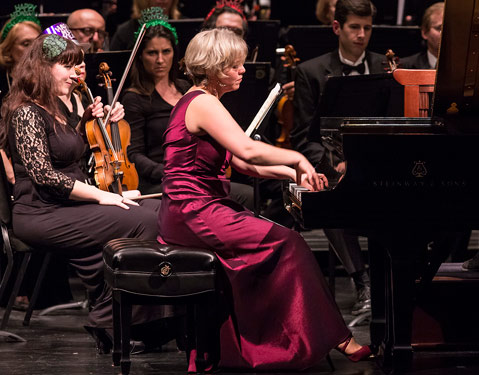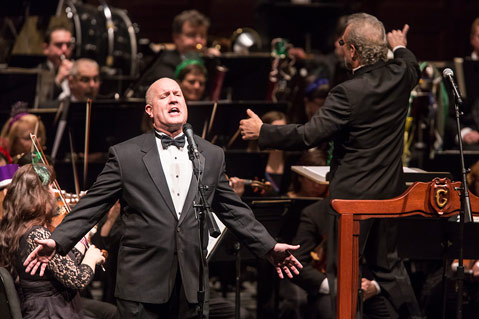Santa Barbara Symphony at the Granada Theatre
The Symphony’s Annual New Year’s Eve Pops Rang in 2013

How do you know when it’s New Year’s Eve at the Granada? You could probably tell just by looking at the fashionably dressed crowd, but the real answer is listen to all those crazy noisemakers. Yes, the price of admission to the Santa Barbara Symphony’s annual New Year’s Eve Pops Concert does include a noisemaker and a party hat, but despite frequent outbursts of celebratory merriment from enthusiastic and well-equipped patrons, the festivity in the audience never fully drowned out a very satisfying and diverse concert. Guest conductor Bob Bernhardt made a great match for this occasion, bringing just the right mix of wit and musical knowledge to keep things light and bubbly. The concert opened with John Williams — the march from his score to Superman — and, even as maestro Bernhardt joked about the piece being from Vienna, he and the orchestra made it clear that the evening’s home base would be Hollywood. Next up was something authentically Viennese, Franz Lehár’s “Ballsirenen” waltzes from The Merry Widow, always an appropriate choice on New Year’s Eve.

After Ojai composer Robin Frost’s rousing orchestral arrangement of the Gershwin brothers’ “Strike Up the Band,” tenor Tim King delivered the romance on their incredibly beautiful and bittersweet (it was the last song George wrote) classic “Love Is Here to Stay.” King stayed on to introduce the evening’s other composer to be featured twice, Leonard Bernstein, and he did so by singing a great version of a perennial favorite — “Maria” from West Side Story.
The evening’s comedic high point came in the byplay between maestro Bernhardt and Dr. Robert W. Weinman, a physicist and music buff who had earned the right to conduct one number during the concert through bidding on an item offered at a charity auction. Weinman, dashing in his white dinner jacket and red high-tops, had never conducted anything before, but he not only managed to get through the performance intact; he actually upstaged the estimable Bernhardt with his affable stage presence and evident pleasure in being the center of attention. The whole episode made for a delightful holiday chuckle.
Matters soon reverted to a more serious mode as pianist Natasha Kislenko closed the first half of the program with the opening movement of Edvard Grieg’s Piano Concerto No. 1 in A Minor. Kislenko’s virtuosity left the audience exhilarated and eager for more. The second half veered toward more conventional and contemporary choices for Tim King — Elton John’s “Can You Feel the Love Tonight” from The Lion King, for example — but still managed to mine the Hollywood treasure trove for some unexpected delights, including the wonderful music that longtime Santa Barbaran Elmer Bernstein (his wife was present in the audience) wrote for the film The Magnificent Seven. After the singing of “Auld Lang Syne,” the happy crowd left buzzing over yet another thing that the Santa Barbara Symphony does very well — the pops.



